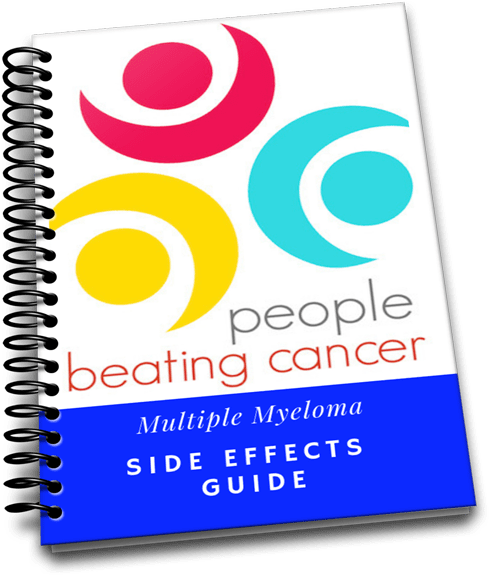Leave a Comment:
2 comments
Is it just radiation that can cause infertility? Not chemo? Is radiation needed for myeloma normally? Thanks much.
ReplyHi Ron- both chemo and radiation can cause infertility-
Reply
Multiple Myeloma an incurable disease, but I have spent the last 25 years in remission using a blend of conventional oncology and evidence-based nutrition, supplementation, and lifestyle therapies from peer-reviewed studies that your oncologist probably hasn't told you about.
Click the orange button to the right to learn more about what you can start doing today.

I was originally diagnosed with multiple myeloma at 34 in 1994. I underwent local radiation to my iliac crest to zap a couple of lesions growing in my lower back. Infertility issues were the last thing on my mind at the time…
My induction chemotherapy and autologous stem cell transplant failed and I was prescribed “palliative radiation” meaning local radiation that would eliminate the bone pain in my iliac crest. I had no idea of the extent of the multiple myeloma side effects that I was in for.
I didn’t know it at the time but the radiation to my pelvic region would leave me sterile. I was single and had spent most of my adult life trying NOT to father a child. It never occurred to me, at 34 years of age, to even ask about my future ability to have children.
My radiation oncologist, Dr. Donald Shina, asked me if I intended to have kids someday. When I replied do Dr. Shina that I would like to have a child someday he recommended that I freeze some sperm.
This discussion occurred WHILE I was on the radiation table preparing to undergo my first course of local radiation.
Three years later, in early 1998, my wife was inseminated with my sperm and voila, Alex was born nine months later (9/25/98). Thank you Dr. Shina.
Ed. Note: Alex just graduated from college- May 29, 2021.
The first thing to remember is that all cancer patients/survivors/caregivers need to consider fertility issues BEFORE they undergo any toxic chemoradiation. The second thing to remember is that the field of reproductive science is changing fast. What I did in ’96 is now ancient science when compared to today.
Because I was young as newly diagnosed MM patients go, few if any newly diagnosed MM patients will read this post. So I guess this post will benefit any newly diagnosed cancer patient who is wondering about fertility issues and their treatments…
The fact is that toxic therapies will cause short, long-term side effects– some of these side effects will be temporary and some will be permanent. There may even be late stage side effects— health issues that you cannot identify until years later.
Cryopreservation has come a long way since my experiences in ’95-’98. The articles linked below give you an idea of the brief history of fertility as it relates to cancer therapies.
As you can read for all the linked information below there is a lot for cancer patients to be concerned about. I am both a long-term cancer survivor and cancer coach. I can help.
1) Please don’t rely on your oncologist to consider fertility issues for you- you are in charge.
2) Please learn about fertility issues BEFORE undergoing toxic therapies.
3) Even at 36 I was embarrassed to even talk about my fertility issues. I think an average teen would be mortified to have a fertility discussion. I would be happy to help if need be.
To Learn More about Cancer and Fertility- click now
Thanks and hang in there
David Emerson
“Young men who undergo chemotherapy during puberty may undergo permanent genetic changes in their sperm that could be passed on to the next generation, the results of a small-scale US study have demonstrated for the first time in humans…
“Investigators have found the chemotherapy dose threshold below which male childhood cancer survivors are likely to have normal sperm production. By clarifying which patients are at highest risk for reduced sperm production as adults, researchers expect the findings to eventually increase use of pre-treatment fertility preservation methods such as sperm banking.”
“Adult and young adult (AYA) cancer survivors face cognitive and sexual late effects from cancer and its treatment, according to data compiled from an online cancer survivorship care planning tool…
“Researchers have found that preserving sperm prior to cancer treatment significantly boosts the odds of men being able to have children after treatment.”
“From the stored tissue, researchers can extract spermatogonial stem cells (SSCs), which are responsible for the continuous production of sperm throughout adult life. Physicians and scientists hope that when the boys reach adulthood, the cells can be transplanted back into their testicles through a simple injection and they will be able to produce sperm…”
“Chemotherapy drugs and radiation to the pelvis cause genetic changes in sperm and oocytes (eggs). Embryos with genetic damage often miscarry early in pregnancy. There is also a risk of having a baby with a birth defect, but so few babies have been conceived during cancer treatment that no statistics exist on the risk of birth defects…”
“Infertility is consistently listed as one of the most distressing long-term side effects of cancer treatment for adolescents and young adults. Yet the leading National Cancer Institute-designated comprehensive cancer centers — which should be leaders in fertility preservation — aren’t doing an adequate job of helping patients protect their fertility, reports a new Northwestern Medicine® study…
Is it just radiation that can cause infertility? Not chemo? Is radiation needed for myeloma normally? Thanks much.
ReplyHi Ron- both chemo and radiation can cause infertility-
Reply